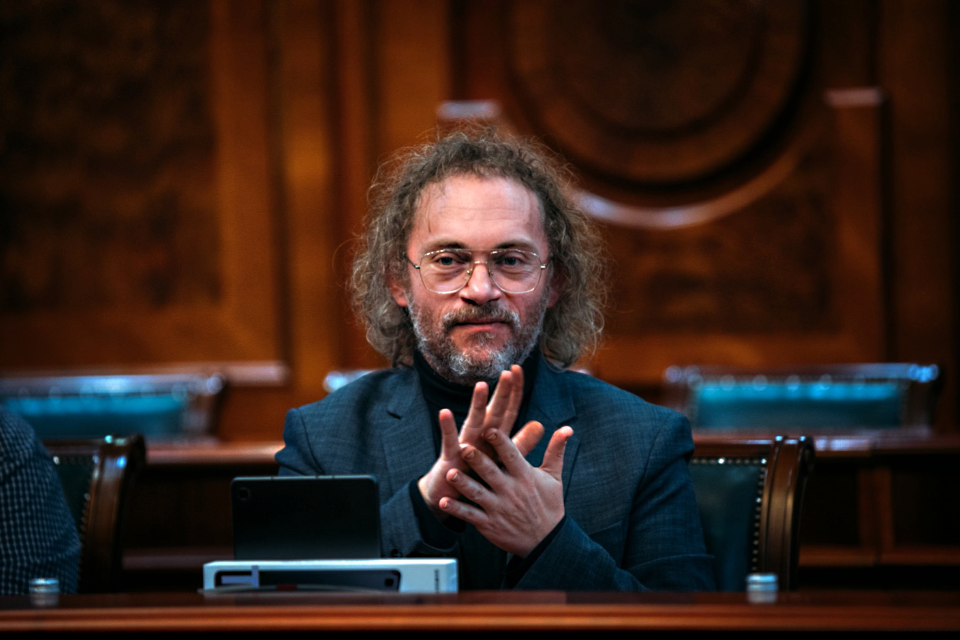Take Five: “New video communication service is a step towards removing invisible barriers in access to justice for women victims of violence who are deaf or hard of hearing”
Date:
UN Women Serbia teamed up with the Ministry of Justice of the Republic of Serbia, to enable access to justice for deaf and hard of hearing women victims of violence. This was part of the "Improved safety of women in Serbia" project, funded by the Norwegian Embassy in Belgrade. Support included procurement of tablets for all 63 basic courts in Serbia, which will improve the use of a specialized video communication service. Mihailo Gordić, vice president of The City Organization of the Deaf Persons of Belgrade, spoke to UN Women about why this project was critical, and why more recognition of deaf and hard of hearing persons’ needs, including women victims of violence, was important.

What are the biggest obstacles that deaf and hard of hearing people face in everyday life and how do they overcome these?
By far the biggest obstacle is access to information and communication. To overcome this, it is necessary for deaf people to have a bilingual education in their mother tongue, Serbian sign language, and in the official language of the country. Awareness about the linguistic status of Serbian sign language in our country is very low.
Deaf people in Serbia still need to explain that Serbian is not their mother tongue and that textual translation from spoken to written Serbian does not mean much to them. If we want communication to go smoothly and to enable access to information and various content for deaf people, it is necessary to provide translation into Serbian sign language.
Serbian sign language is the mother tongue of the deaf in Serbia, and Serbian is the second language they learn, but do not speak so well. As Serbian and English differ, so do English and Serbian sign language. Sign language is not universal, there is a national sign language in every country.
To make life easier for deaf and hard of hearing people, which services are available, and which ones are missing?
Without Serbian sign language interpreters, access to information and communication would be almost non-existent for deaf or hard of hearing people. Since 2010, the Ministry of Labour, Employment, Veteran and Social Policy has financially supported the translation services of Serbian sign language interpreters, which helps significantly to facilitate communication for deaf people. Associations and the deaf community in Serbia are very grateful for this support, but the number of interpreters is very limited. Numerous services are missing, but all of them stem from inaccessibility to education as well as insufficiently qualified interpreters for Serbian sign language, for which there is no comprehensive or formal training in Serbia.
Starting this year, tablets will be introduced across Serbia’s courts to help deaf and hard of hearing people, including women who are also victims of violence. How important is this effort?
The project is extremely important because in this way deaf people, including deaf women who are victims of domestic violence, will be able to access the justice system and all relevant information. Communication will take place in a timely and uninterrupted manner.
How will this service work?
The service operates online through the National Translation Center for Serbian Sign Language. For example, a deaf person comes to court and wants to get information or report something. A court clerk in charge of the tablet contacts a Serbian sign language interpreter at the National Serbian Sign Language Interpreting Centre who translates communication between the deaf person and a court representative.
How important is the support of UN Women and the Ministry of Justice in providing access to justice for deaf and hard of hearing women victims of violence as well as for all deaf and hard of hearing people?
The support of UN Women and the Ministry of Justice is immeasurable. Without this support, the justice system would continue to be almost inaccessible to deaf people and especially deaf women who are victims of domestic violence. We have to bear in mind that the number of women in this situation is on the rise. This service will certainly empower and improve the independent functioning of deaf people in Serbia. It is a step towards removing invisible barriers and it is a matter of protecting the lives and dignity of people with disabilities, including deaf and hard of hearing people.